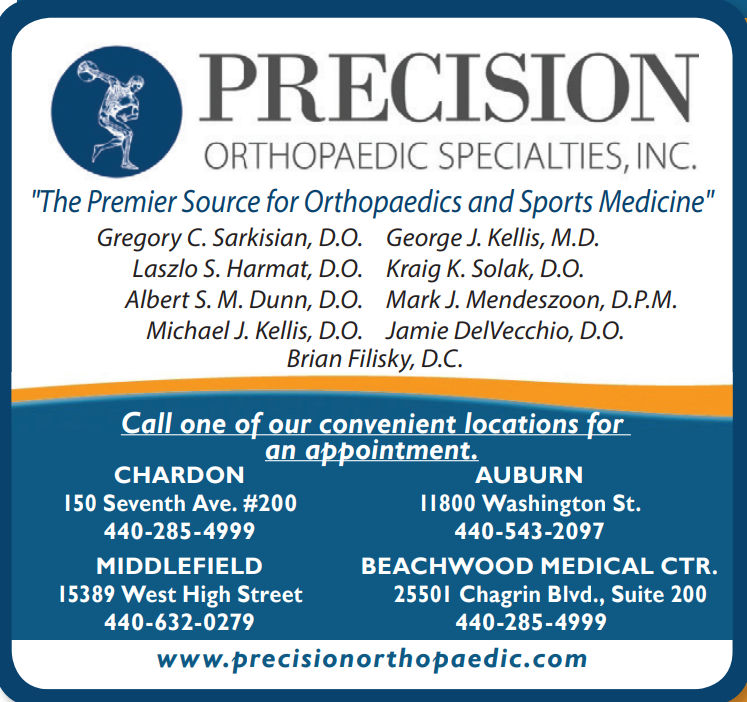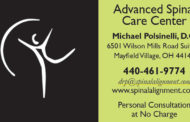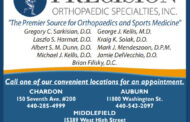
GENERAL ORTHOPAEDICS
TREATMENT OF SHOULDER, ELBOW, & HAND CONDITIONS
ROTATOR CUFF & REVERSE SHOULDER REPAIR
JOINT REPLACEMENT & ARTHROSCOPY
MICROSURGERY
DIGITAL REPLANTATION
Laszlo S. Harmat D.O. is a board certified orthopaedic surgeon who is fellowship trained in conditions of the shoulder, elbow and hand. Dr. Harmat is well versed in all aspects of general orthopaedics including arthroscopy of the joints and total joint replacement. Completing the Cleveland Combined Hand and Upper Extremity Fellowship at The Cleveland Clinic Foundation and Metro General Hospital, Dr. Harmat brings special skills in treating upper extremity conditions, microsurgery and total shoulder replacement.
Dr. Harmat is Chief of Staff at University Hospital Geauga Medical Center and is also on staff at Lake Health Tripoint Medical Center. He is accepting new patients at Precision’s Chardon and Middlefield locations.
By Dr. Laszlo Harmat
This time of year many of us are out working in the yard using leaf blowers, chain saws, lawn mowers and many other hand held tools. These activities aggravate many of our body parts, including our hands and can worsen the symptoms of carpal tunnel syndrome.
There are several conditions that can cause numbness in the hands, however, carpal tunnel is certainly the most common. Although carpal tunnel syndrome is more prevalent in those over forty, it can affect people of all ages.
In the early stages of carpal tunnel, we may notice only some tingling or occasional numbness in our hands and fingers. This can be brought on by increased activity or repetitive actions. Initially, this may seem to come and go, but as the condition worsens, it becomes more prevalent with numbness involving the thumb, index and middle finger.
The tell-tale sign of carpal tunnel syndrome is waking up at night or early in the morning with the hands feeling numb and achy. Reaching for the alarm clock with a hand that feels like it is not functioning properly oftentimes is a sign of carpal tunnel syndrome. We also may notice numbness while gripping the steering wheel when driving or holding a book while reading.
Some treatment options include stretching exercises where the fingers are pulled back towards the top of the wrist, allowing you to feel the stretch in the palm of your hand. Hold this position for approximately 15-20 seconds then repeat. Mild anti-inflammatory agents such as Aleve or Advil can also be helpful. Other over the counter remedies include vitamin B6, which may help nerve recovery and can be beneficial in the early stages of carpal tunnel syndrome. Wearing a wrist splint at night may also help. These splints keep the wrist from bending while we sleep, which may prevent the numbness and aching from occurring, allowing us to have a restful night sleep.
If conservative measures do not seem to provide relief, it may be time to seek medical treatment. Nerve tests can be performed to help determine if you have carpal tunnel syndrome or if another problem may be causing your symptoms. These tests can also help determine the severity of your condition.
Depending on the test results, treatment can be rendered appropriately. If discovered in the early stages, carpal tunnel syndrome can be treated very successfully through surgical intervention, typically with complete resolution of the tingling and numbness. This procedure, called carpal tunnel release, is a simple out-patient surgery that takes just minutes and can be done with a local or regional anesthetic. The incisions are usually quite small, measuring anywhere from 1/2” to 1” in size. There are several techniques for carpal tunnel surgery and most of them are extremely successful.
If you are waking up with numb hands and having difficulty with daily activities, give conservative measures a try. If your symptoms persist or seem to be worsening, it may be time to visit your physician for a thorough evaluation.
























